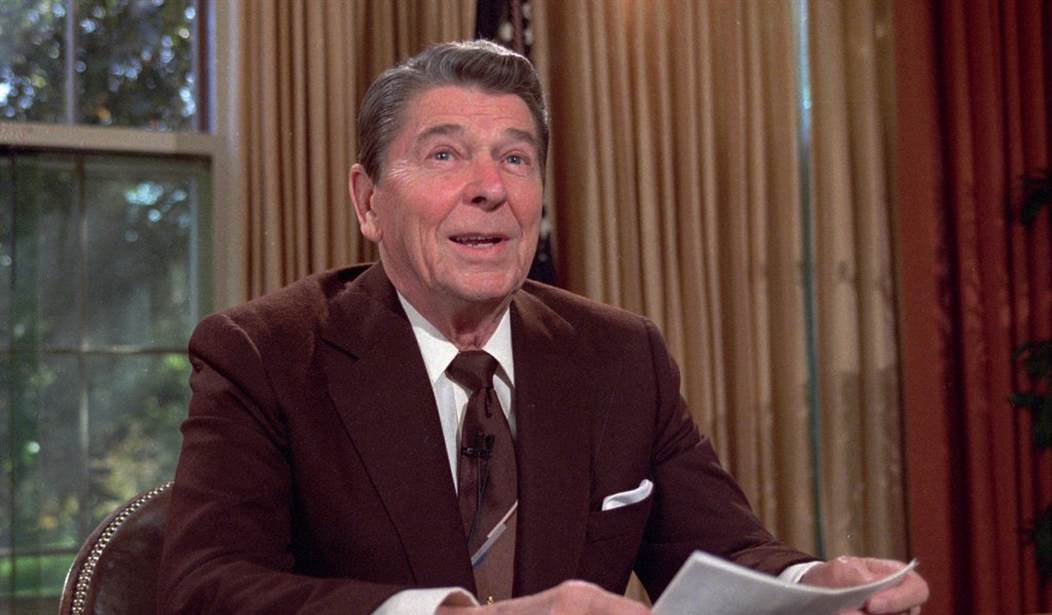The following is commentary from the American Conservative Union's newest book, Reagan at CPAC: The Words that Continue to Inspire a Revolution, available for purchase today.
Commentary On: We Will be as a City Upon a Hill
President Reagan's speech at the inaugural Conservative Political Action Conference came in 1974, just six years before officially declaring his run for the White House. It would be his first of thirteen addresses to the conference that has become a driving force behind conservative policy and principle for nearly a half-century.
At the time, Reagan was viewed by the American Conservative Union as the leader who could rally conservatives and restore our country after decades of liberalism had led us astray. Eventually, that support in the wake of Goldwater's failed presidential run paid off for Reagan. He was elected governor of California and managed it back from ruin, was proudly pro-life, believed that free markets create prosperity, warned against government spendthrifts who "borrow against the future," and most importantly, vowed to fight for America and the freedoms we still stand for today.
At the first gathering of conservatives at CPAC, Reagan chose to forgo remarks debating current political topics and instead made the decision to focus on America's heritage and journey into the future. Reagan said that this country belongs to everyone who is "possessed of an abiding love of freedom and a special kind of courage. This was true of those who pioneered the great wilderness in the beginning of this country, as it is also true of those later immigrants who were willing to leave the land of their birth and come to a land where even the language was unknown to them. Call it chauvinistic, but our heritage does set us apart."
Recommended
This concept is hardly chauvinistic, but instead expresses reverence for those first Americans whose sacrifices made our unique democracy possible. Reagan never shied away from the fact that America was the best and most free country on the face of the planet. He regularly promoted American exceptionalism throughout his life. He did so early on in his political career as governor of California, throughout his presidency— which freed nations around the globe—and continued to promote our American values throughout the world after his presidency.
But Reagan knew American exceptionalism came at a price, paid in the past by bold men who rejected the rule of a faraway king. He understood the painful and risky decisions that were made before July 4, 1776 in order to establish a free nation based on the liberty of the individual. Death was the consequence for failure, but because the Founding Fathers cared so deeply about America, they moved forward anyway. Putting everything on the line—their lives, fortune, and sacred honor—was worth it.
The signing of the Declaration of Independence, a document that created a new nation and declared war on the most powerful military in the world, was a miracle. Reagan knew this and often reminded the audience of its importance. He did this to ensure that future generations never took America's history for granted.
In addition to his promotion of freedom, Reagan stressed America's crucial adherence to the United States Constitution as another example of what sets America apart from the rest of the globe, calling it "the culmination of man's dreams." He noted that other nations had chartered their own constitutions, and that "[t]he difference [between the U.S. Constitution and the others] is so subtle that we often overlook it, but it is so great that it tells the whole story. Those other constitutions say, 'Government grants you these rights,' and ours says, 'You are born with these rights, they are yours by the grace of God, and no government on earth can take them from you.'"
Reagan repeatedly warned that in order to preserve this founding principle of the sovereign individual, limits on the size of government are essential. After all, the larger the government becomes, the more it squeezes and limits personal liberty.
"Now we are a nation of 211 million people with a pedigree that includes blood lines from every corner of the world. We have shed that American-melting-pot blood in every corner of the world, usually in defense of someone's freedom," he said. America today remains the same as Reagan praised it to be in 1974. His words have echoed through the generations to encourage and inspire the most incredible and blessed country on earth while reminding us that we must work each day to protect that which makes America so special.
"We cannot escape our destiny, nor should we try to do so. The leadership of the free world was thrust upon us two centuries ago in that little hall of Philadelphia," Reagan concluded. "We are indeed, and we are today, the last best hope of man on earth."
So long as America stays true to our founding and destiny, we will forever be a shining city on a hill for the entire world to see.
Edited and introduced by Matt Schlapp, the chairman of the American Conservative Union, and with an afterword by Reagan’s former Counselor and Attorney General Edwin Meese III, Reagan At CPAC is an invaluable addition to any conservative’s bookshelf.

























Join the conversation as a VIP Member